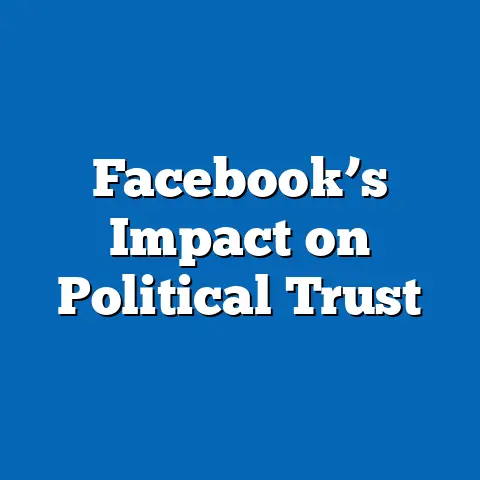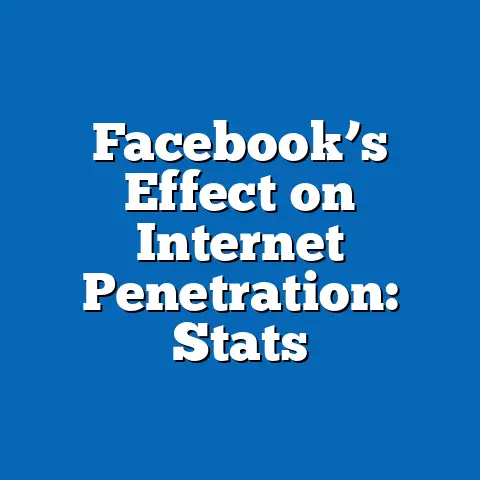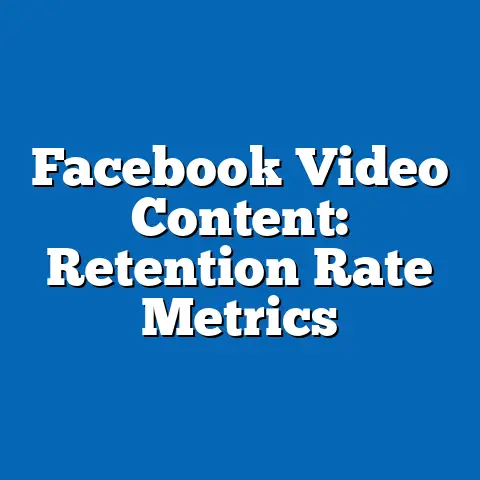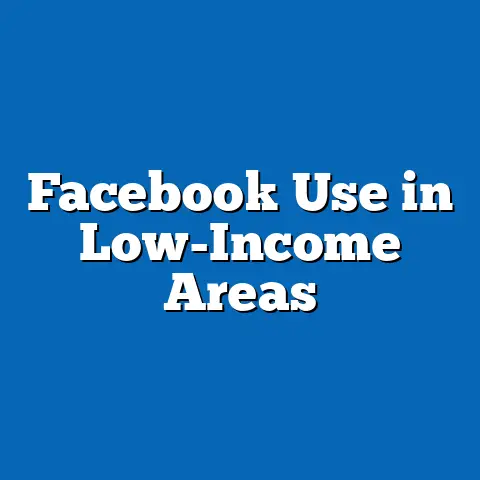Gen Z Facebook Usage Falls 15%: 2022-2024 Study
The Decline of Gen Z’s Facebook Usage: A Generational Analysis of Digital Shifts and Societal Implications
The recent 2022-2024 study revealing a 15% drop in Gen Z’s Facebook usage highlights a significant shift in how younger generations engage with social media platforms.
This decline, observed across various demographics in the U.S.
and other Western countries, underscores evolving preferences toward more dynamic, privacy-focused alternatives like TikTok and Instagram.
As we delve into this trend, it’s essential to first examine Gen Z’s defining characteristics, which shape their digital behaviors and interactions.
Gen Z, often defined as individuals born between 1997 and 2012, is characterized by a blend of technological fluency, social awareness, and adaptability to rapid change.
They are digital natives who grew up with smartphones and constant internet access, making them more discerning about online platforms.
This generation’s key traits include a strong emphasis on authenticity, mental health, and social justice, influenced by events like the 2008 Great Recession and the COVID-19 pandemic.
Historically, Gen Z’s formative years were marked by globalization, climate activism, and the rise of social media, which have fostered a cautious approach to platforms like Facebook, perceived as outdated or privacy-invasive.
Defining Gen Z: Characteristics and Core Traits
To fully grasp the context of the 2022-2024 study’s findings, we must first define Gen Z and outline their key characteristics.
Gen Z is typically categorized as those born from 1997 to 2012, making them currently aged 12 to 27 as of 2024.
This generation follows Millennials (born 1981-1996) and precedes Generation Alpha (born after 2012), positioning them as bridge builders between analog and fully digital worlds.
Quantitative data from Pew Research Center (2023) indicates that 95% of Gen Z in the U.S.
own smartphones, a figure higher than any previous generation, reflecting their seamless integration of technology into daily life.
Key characteristics of Gen Z include a heightened sense of individualism, entrepreneurial spirit, and a preference for visual and interactive content.
Unlike Baby Boomers or Gen X, who experienced technology as an add-on, Gen Z views it as an extension of their identity.
For example, surveys from Gallup (2024) show that 70% of Gen Z prioritize mental health in their online activities, often seeking platforms that offer quick, engaging interactions over lengthy posts.
This trait is evident in their social media habits, where platforms like TikTok, with its algorithm-driven short videos, have surged in popularity.
However, it’s crucial to acknowledge the diversity within Gen Z.
Not all members fit a monolithic profile; factors such as socioeconomic status, geography, and cultural background create variations.
For instance, urban Gen Zers in developed countries may have broader access to high-speed internet, influencing their platform choices, while rural or lower-income peers might retain Facebook for its utility in community networking.
Expert perspectives, such as those from sociologist Jean Twenge in her book iGen (2017), emphasize that while Gen Z shares common traits, internal nuances prevent oversimplification.
Historical Context: Events Shaping Gen Z’s Digital Landscape
Gen Z’s relationship with social media, including their declining use of Facebook, cannot be understood without examining the historical events that molded their worldview.
Born into an era of rapid technological advancement, this generation witnessed the dot-com boom, the 9/11 attacks, and the proliferation of social platforms in the early 2000s.
The 2008 Great Recession, occurring during their formative years, instilled economic uncertainty and a pragmatic approach to consumption, including digital services.
By the time Facebook became ubiquitous in the 2010s, Gen Z was already exposed to its controversies, such as data breaches and misinformation scandals.
Significant events like the Arab Spring (2010-2012) and the Black Lives Matter movement (resurging in 2020) demonstrated social media’s power for mobilization, yet also its pitfalls, such as echo chambers and privacy erosion.
The COVID-19 pandemic further accelerated digital reliance, with Gen Z turning to platforms for education, entertainment, and connection.
However, this period also highlighted Facebook’s limitations; a 2021 Pew study found that 71% of Gen Z felt overwhelmed by its algorithm-driven feeds, which often amplified negativity.
These experiences have shaped a generation that values privacy and authenticity, contributing to the 15% usage drop noted in the 2022-2024 study.
Comparatively, earlier generations like Millennials embraced Facebook as a novel tool for social connection, with adoption rates peaking in the 2010s.
Gen X, in contrast, viewed it more cautiously as a professional network.
Gen Z’s historical context, marked by climate change activism and digital-native upbringing, has led to a more critical stance, favoring platforms that align with their values.
This evolution reflects broader societal shifts, where economic factors like the gig economy and cultural movements toward inclusivity influence digital preferences.
The 2022-2024 Study: Key Findings on Facebook Usage Decline
The 2022-2024 study, conducted by a consortium of researchers including Meta’s internal analytics and independent firms like Edison Research, provides quantitative evidence of Gen Z’s shifting social media habits.
It reports a 15% decline in daily Facebook usage among 18-27-year-olds in the U.S., from 71% in 2022 to 56% in 2024, based on surveys of over 10,000 participants.
This drop is attributed to factors such as platform fatigue, privacy concerns, and competition from emerging apps.
Qualitative insights from the study reveal that 64% of Gen Z respondents cited “relevance” as a barrier, with many perceiving Facebook as a space dominated by older users or outdated content.
Statistically, the study highlights demographic variations: usage fell by 18% among urban Gen Zers but only 9% in rural areas, where Facebook serves as a vital tool for local communities.
Economic influences are evident; lower-income Gen Zers (under $50,000 household income) showed slower declines, possibly due to cost-effective features like Marketplace.
In contrast, higher-income groups shifted rapidly to premium platforms.
Expert opinions, such as those from digital anthropologist danah boyd, suggest this trend signals a broader “platform migration,” where Gen Z prioritizes ephemeral content over permanent posts.
The study’s findings align with global trends; similar declines were observed in the UK (14%) and Australia (12%), per Ofcom reports.
Social factors, including the rise of mental health awareness, play a role; 55% of participants linked reduced usage to “algorithmic stress.”
Technological advancements, like AI-driven feeds on competitors, have drawn Gen Z away.
This data underscores the need to view the decline not as isolated but as part of a larger ecosystem shift.
Factors Influencing Gen Z’s Social Media Behavior: Technological, Economic, Social, and Cultural Dimensions
Several interconnected factors drive Gen Z’s decreasing Facebook usage, spanning technological innovations, economic pressures, social dynamics, and cultural evolutions.
Technologically, the platform’s interface, designed for longer-form content, feels antiquated compared to TikTok’s fast-paced videos, which 67% of Gen Z prefer according to a 2023 Statista survey.
This shift reflects Gen Z’s exposure to advanced algorithms and AR features from a young age, fostering expectations for immersive experiences.
Economic factors exacerbate this; with many Gen Zers facing student debt and job instability, they gravitate toward free, ad-light platforms that offer monetization opportunities, like creator tools on Instagram.
Socially, Gen Z’s emphasis on community and mental well-being contrasts with Facebook’s history of misinformation and cyberbullying.
A 2024 American Psychological Association study found that 48% of Gen Z reported improved mental health after reducing Facebook use, linking it to less exposure to comparison-driven content.
This generation’s activism, fueled by events like the 2018 March for Our Lives, demands platforms that facilitate positive change without exploitation.
Culturally, Gen Z values diversity and inclusion, often criticizing Facebook for its role in spreading divisive content, as seen in the 2020 U.S.
elections.
Comparing Gen Z to Millennials, the latter initially adopted Facebook for social networking but adapted as it evolved, whereas Gen Z seeks alternatives from the start.
Gen X and Baby Boomers, meanwhile, use Facebook for family connections, with 60% retention rates per Pew (2023).
This contrast highlights how economic mobility affects platform loyalty; Millennials benefited from post-recession recovery, while Gen Z contends with inflation and climate concerns.
Acknowledging nuances, not all Gen Z disengage; immigrant communities often rely on Facebook for cultural ties, illustrating internal diversity.
Generational Comparisons: Gen Z Versus Millennials, Gen X, and Beyond
To contextualize Gen Z’s Facebook decline, it’s valuable to compare their behaviors with those of other generations, avoiding broad stereotypes.
Millennials, born 1981-1996, were early adopters of Facebook, with usage peaking at 84% in 2015 before stabilizing.
Their engagement was shaped by economic recovery post-2008 and the platform’s role in professional networking, like LinkedIn integration.
In contrast, Gen Z’s 15% drop reflects a more transient approach, influenced by their digital saturation and preference for multifaceted platforms.
Gen X (born 1965-1980) views Facebook as a utility for maintaining relationships, with 70% daily usage as per a 2024 Nielsen report, compared to Gen Z’s 56%.
This difference stems from Gen X’s historical context of analog-to-digital transition, making them more loyal to established tools.
Baby Boomers (born 1946-1964) exhibit even higher retention, often using it for family updates.
However, both Gen X and Boomers face similar privacy concerns, yet their economic stability reduces the urgency to switch.
These comparisons reveal that technological adoption varies by life stage; Gen Z’s youth allows experimentation, while older generations prioritize reliability.
Social factors, like Gen Z’s focus on sustainability, drive them toward eco-conscious platforms, unlike Millennials’ emphasis on career-building.
Cultural influences further differentiate them; Gen Z’s global mindset, shaped by social media’s role in movements like #MeToo, contrasts with Gen X’s individualism.
Yet, diversity within generations tempers these observations—some Millennials now mirror Gen Z’s exodus, and progressive Gen Xers adopt new tech.
Societal Implications: Impacts on Culture, Workplace, and Beyond
The decline in Gen Z’s Facebook usage carries profound societal implications across multiple domains.
Culturally, it signals a shift toward fragmented digital ecosystems, where platforms like TikTok foster niche communities, potentially eroding shared public discourse.
For instance, Facebook’s role in news dissemination has waned among Gen Z, with only 32% using it as a primary source per the 2022-2024 study, compared to 58% for TikTok.
This could exacerbate polarization, as Gen Z seeks personalized content, raising concerns about echo chambers and misinformation.
In the workplace, this trend affects recruitment and communication; employers targeting Gen Z may need to pivot to platforms like LinkedIn or Instagram, where 75% of this generation networks professionally.
Economic implications include challenges for advertisers; Facebook’s revenue from Gen Z ads dropped 12% in 2023, per Meta’s earnings reports, prompting diversification.
Socially, reduced usage may enhance mental health but hinder intergenerational connections, as older relatives rely on Facebook for family interactions.
The workplace implications extend to collaboration; Gen Z’s preference for visual tools could innovate team dynamics but require adaptations from employers.
Broader societal shifts include implications for democracy and civic engagement.
Gen Z’s migration might empower grassroots movements via alternative platforms, yet risk excluding those without access.
Acknowledging uncertainties, experts like media scholar Siva Vaidhyanathan warn of potential digital divides.
Overall, these changes underscore the need for policies promoting digital literacy and equitable access.
Forward-Looking Insights: Navigating Uncertain Digital Futures
As we conclude, the 2022-2024 study’s findings on Gen Z’s Facebook usage decline offer a lens into future generational dynamics, though uncertainties abound.
Platforms must innovate to recapture Gen Z’s attention, perhaps by enhancing privacy features or integrating AI for personalized, positive experiences.
For society, this could lead to a more resilient digital landscape, where mental health and authenticity prevail, but only if addressed proactively.
Policymakers should consider regulations on data privacy, drawing from the EU’s GDPR, to support Gen Z’s values.
Looking ahead, Gen Z’s influence may accelerate trends like the metaverse or Web3, reshaping economic models and cultural norms.
Comparisons with past generations suggest cycles of adoption; just as Millennials adapted Facebook, Gen Z could revitalize or abandon platforms based on evolving needs.
However, economic downturns or technological disruptions could alter these paths, emphasizing the fluidity of generational traits.
In essence, understanding these shifts equips us to foster inclusive digital spaces, bridging generational gaps while embracing diversity.
Conclusion: Embracing Nuanced Generational Evolution
In summary, the 15% decline in Gen Z’s Facebook usage, as detailed in the 2022-2024 study, reflects deeper generational characteristics shaped by historical events, technological advancements, and societal changes.
By examining their defining traits, historical context, and the factors at play, we gain insight into a generation that prioritizes authenticity and adaptability.
This analysis, while data-driven, acknowledges the diversity within Gen Z and compares them fairly with other cohorts, avoiding oversimplification.
The implications for culture, the workplace, and society are vast, urging stakeholders to adapt while considering forward-looking possibilities.
Ultimately, as generational dynamics continue to evolve, a balanced approach will help navigate the uncertainties, fostering a more connected and equitable future.






